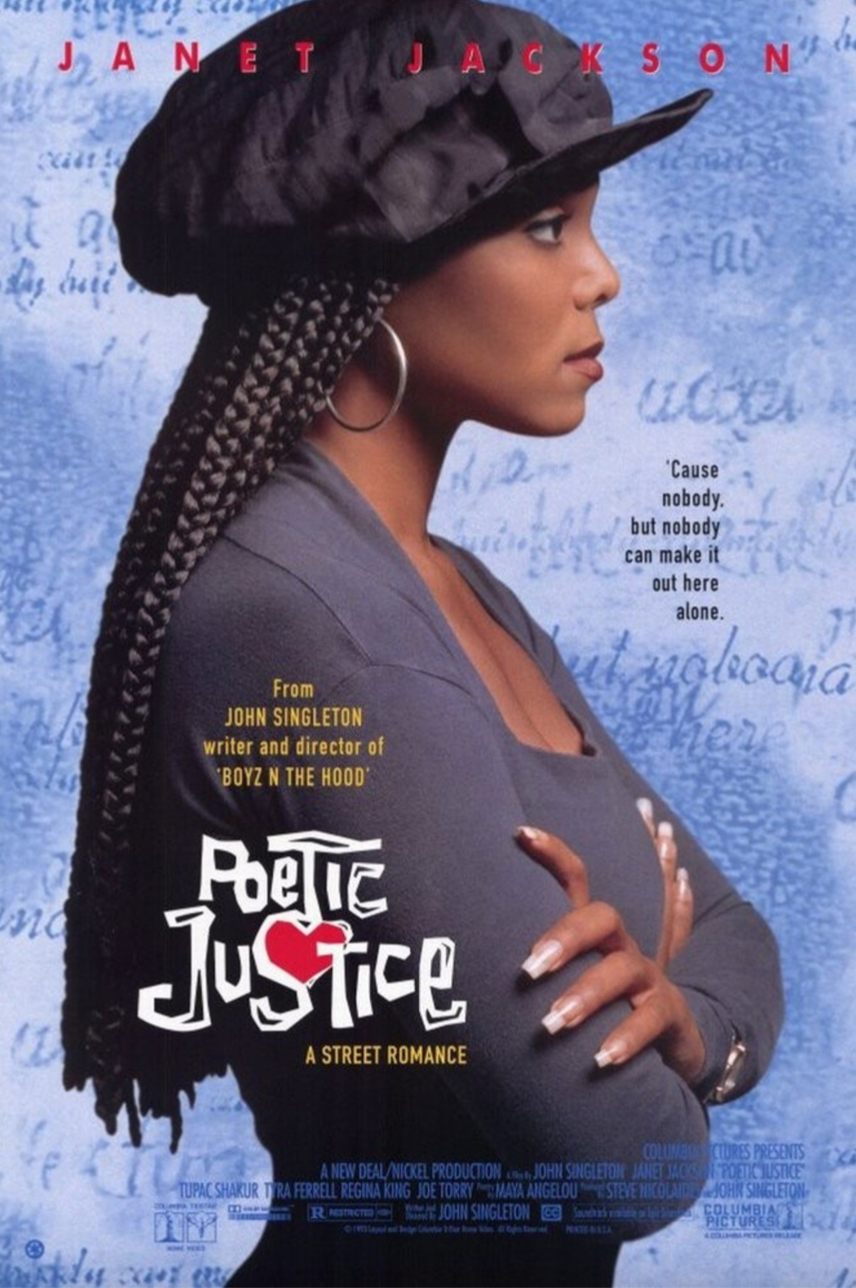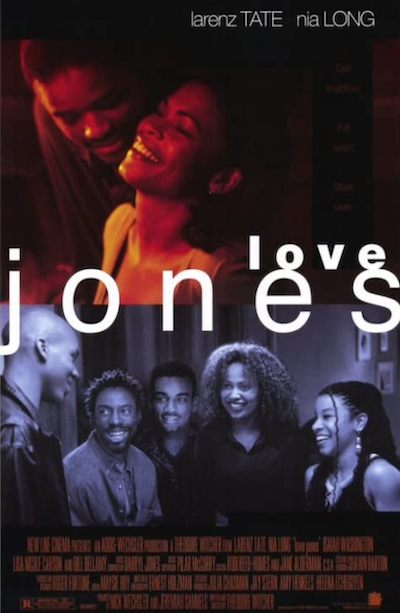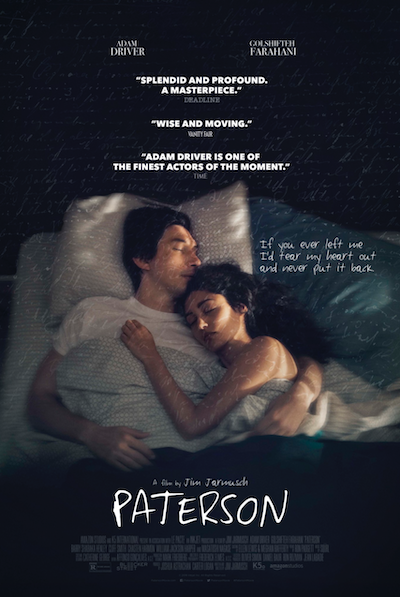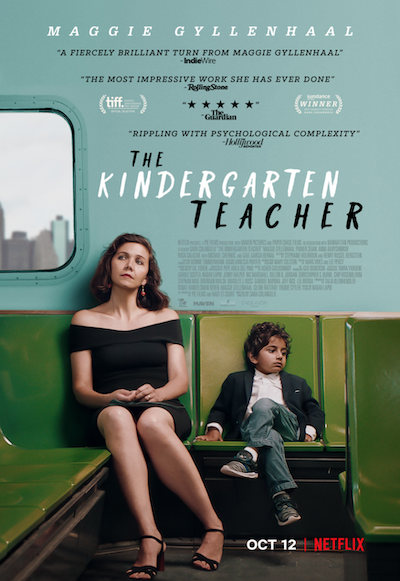Without further ado, here are those films. Like book acknowledgements, I enjoy watching movie credits from beginning to end. I love sitting in a film’s magic, feelings steeping while admiring the myriad names that make movies possible. As Poetic Justice’s credits roll, I pause the screen on Maya Angelou’s name and hold close one of my many wishes. May Hollywood treat poets like the superstars they are. From “Alone” to “Phenomenal Woman,” the 1993 film features five of Maya Angelou’s poems. Dr. Angelou also makes a cameo as Aunt June at the Johnson Family Reunion, where Justice, Iesha (Regina King), Lucky (Tupac Shakur), and Chicago (Joe Torry) stop for food between Los Angeles and Oakland. In a pink hat and pearls, Aunt June — sitting with the other “Calendar Sisters,” Aunt April and Aunt May — asks Iesha and Chicago, “Are you all in love?” What a poet-y thing to say, I think. Aunt June continues, “Baby, what would you know about love?” Which feels like an opening line, doesn’t it? To read the above poems and “In a Time,” “A Kind of Love, Some Say,” and “A Conceit,” reach for Maya Angelou: The Complete Poetry. Nina writes, too, but viewers must wait. On an evening walk with Darius, she recites “Poem No. 3.” A “lifelong fan,” Sonia Sanchez’s work makes Nina want to set fire to her notebook. If you, like me, collect collecteds, Sanchez’s Collected Poems recently published in paperback. The hardcover, a gift from my beloved, adorns my book cart. After discovering Darius’s book and moving dedication, Nina performs at the poetry club for the first time. The poem, “Lyric: I Am Looking at Music” from Girl at the Window by Louisiana’s “first African American poet laureate,” stilled me. Lines I keep thinking about long after rewinding the moment to transcribe the entire piece: “It lies suspended in hills, a blue line in a red sky. I am looking at sound.” For Poets & Writers’ blog, Kelly Harris reports that Pinkie Gordon Lane thought Long “got the poem right in the film, ‘even the sniffles.’” Quite poetically, repetition arises across this town teeming with poets, from overheard spoken word by Method Man in the laundromat to a bench shared with a poet from Osaka, who “breathe[s] poetry.” Soon after discussing two dream children, Paterson spots twins in matching plaid jackets while strolling to work as the first lines of “Love Poem” arrive. “We have plenty of matches in our house,” Paterson repeats. Based in Paterson, New Jersey, Paterson is a “bus driver that likes Emily Dickinson,” as a young poet, and twin, later observes. In this darling scene, Paterson happens upon the long-haired poet, amid factories, toiling over a “secret notebook.” The spirited writer shares “Water Falls,” which starts, “Water falls from the bright air.” The final line — “Most people call it rain.” — stuns me. So different from the prior language: puddles described as “dirty mirrors with clouds and buildings inside.” For the 2016 film, Jarmusch wrote “Water Falls,” and Ron Padgett, the titular poet’s work. Dot, Padgett’s forthcoming collection from Coffee House Press (November 2022), “shows how any experience, no matter how mundane, can lead to a poem that flares like gentle fireworks.” In Sara Colangelo’s adaptation of Nadav Lapid’s 2014 film of the same title, the color blue fascinates me. Lisa’s close and unwavering blue-eyed gaze. The blue pen Lisa holds before sharing her haiku, written by Dominique Townsend. The lake near Placid Oaks Motel. In blue water, under a blue sky, Jimmy announces, “I have a poem.” At the lake’s edge, Jimmy paces in shin-high water while composing as, from land, Lisa records the movie’s final poem: “Anna, get up. Remember, loneliness is still time spent with the world.” In an article by Alexandra Alter for The New York Times, Townsend, the author of The Weather & Our Tempers, calls penning Lisa’s poems a “strange process.” Kaveh Akbar and Ocean Vuong wrote Jimmy’s poetry. “The Bull,” a poem Vuong adapted for the 2018 release, opens Time Is a Mother, his latest collection. Encountering the familiar title and those echoes in the beginning lines of my two-person book club’s current read felt kismet. During a Between the Covers conversation with David Naimon, Akbar, the author of, most recently, Pilgrim Bell, discusses writing “It Gets So Dark” from a 5-year-old’s point of view. Akbar acknowledges the “constraint” of constructing a “literary” poem with a child’s “vocabulary.” Just in case any poets out there need a prompt.



